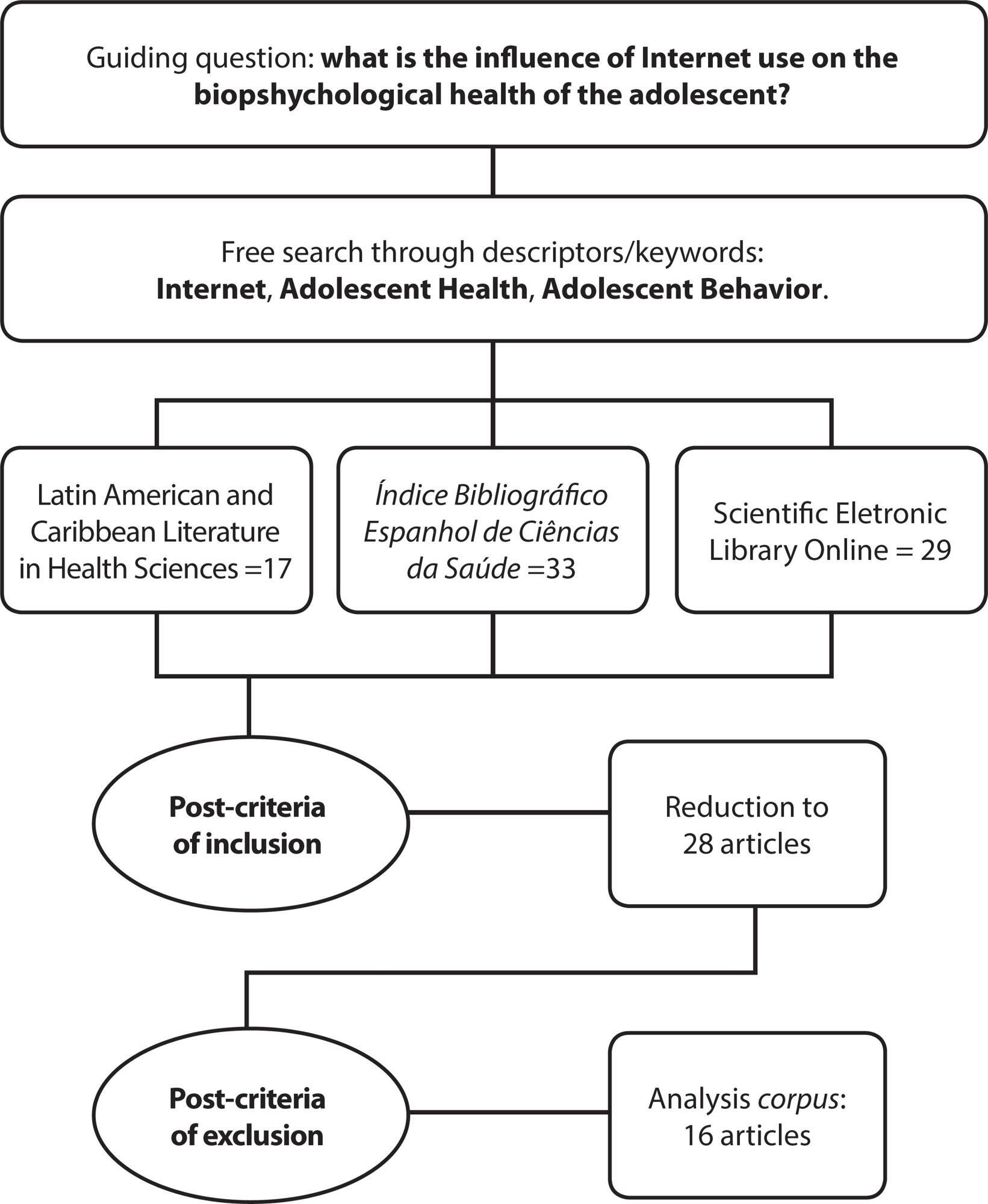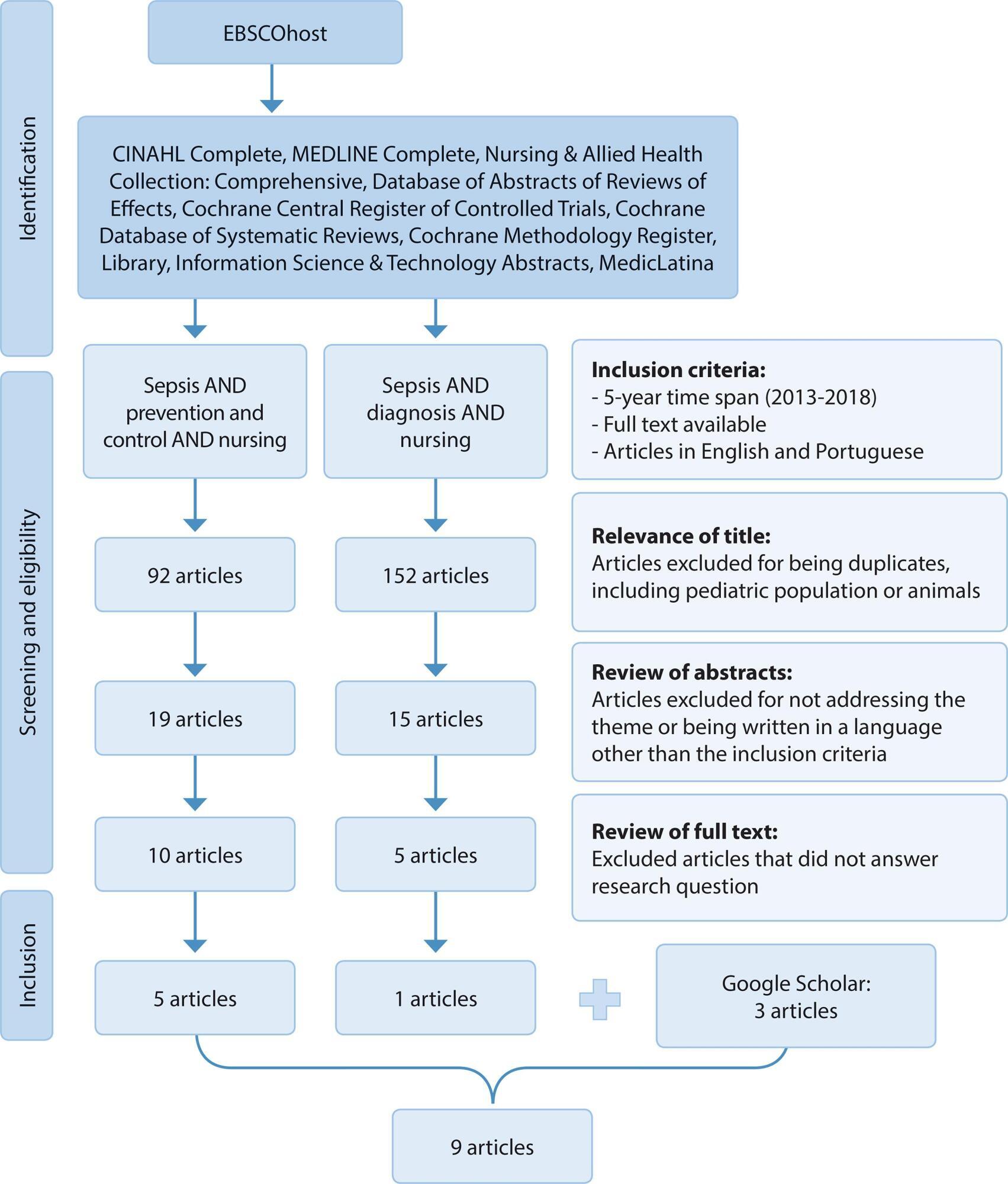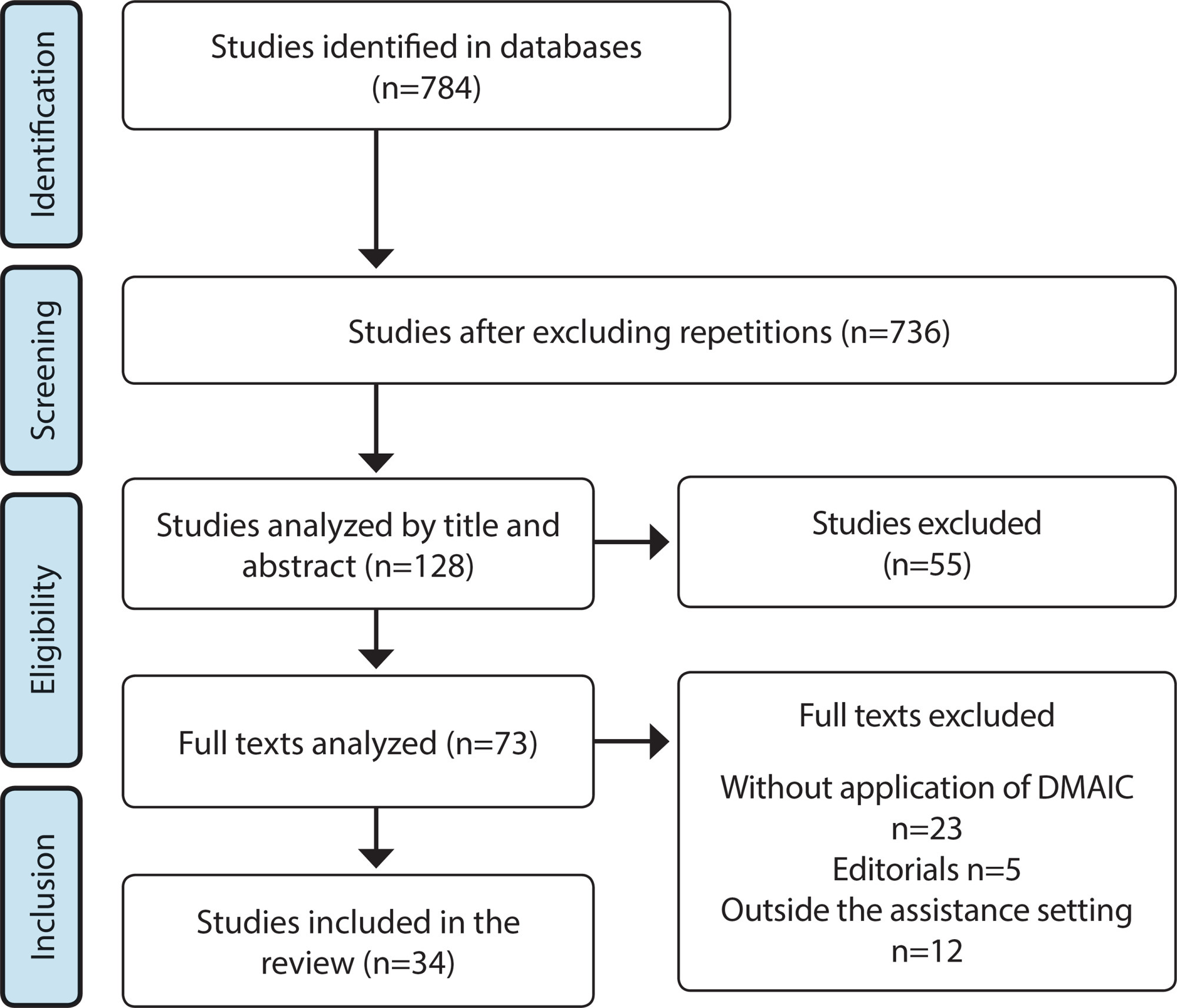-
ORIGINAL ARTICLE12-13-2024
Nurses’ experience regarding patient safety in mobile pre-hospital care
Revista Brasileira de Enfermagem. 2024;77(5):e20230529
Abstract
ORIGINAL ARTICLENurses’ experience regarding patient safety in mobile pre-hospital care
Revista Brasileira de Enfermagem. 2024;77(5):e20230529
DOI 10.1590/0034-7167-2023-0529
Views0See moreABSTRACT
Objectives:
to understand nurses’ experience regarding patient safety in mobile pre-hospital care.
Method:
a qualitative, exploratory and descriptive study, conducted with nurses active in mobile pre-hospital care services. Semi-structured interviews were conducted, audio-graved and submitted to Bardin’s content analysis.
Results:
from four thematic categories established, nurses reported the care and management skills necessary to work in this service. They demonstrated a commitment to ensuring safe care for patients, staff and spectators. They highlighted the actions taken to prevent and mitigate incidents. However, they based their experiences on practice protocols and individual actions, expressing the need to improve knowledge about patient safety.
Final Considerations:
mobile pre-hospital care nurses’ experience in relation to patient safety was limited, suggesting the need for training on the subject, alignment of work processes and implementation of strategies, aiming to guarantee safe care.
-
ORIGINAL ARTICLE12-13-2024
Stress in nursing workers caring for people with COVID-19
Revista Brasileira de Enfermagem. 2024;77(5):e20230542
Abstract
ORIGINAL ARTICLEStress in nursing workers caring for people with COVID-19
Revista Brasileira de Enfermagem. 2024;77(5):e20230542
DOI 10.1590/0034-7167-2023-0542
Views1See moreABSTRACT
Objectives:
to analyze stress from the perspective of nursing workers caring for people with COVID-19 in a public hospital in the Recôncavo region of Bahia.
Methods:
this is an exploratory qualitative study, conducted through semi-structured interviews. The data were analyzed using word clouds, similarity trees, and content analysis.
Results:
nursing workers were exposed to stress while attending to patients with COVID-19. The reported stressors in the workplace included: work overload, lack of planning, speed in performing tasks, fatigue, lack of participation in decision-making, lack of support from management, technological changes, excessive responsibility without preparation, interpersonal conflicts, and professional undervaluation.
Conclusions:
exposure to these stressors leads to emotional exhaustion and demotivation, which were intensified during the COVID-19 pandemic.

-
ORIGINAL ARTICLE12-13-2024
Knowledge and attitudes of nursing students regarding the sexuality of older adults: a quasi-experimental study
Revista Brasileira de Enfermagem. 2024;77(5):e20240011
Abstract
ORIGINAL ARTICLEKnowledge and attitudes of nursing students regarding the sexuality of older adults: a quasi-experimental study
Revista Brasileira de Enfermagem. 2024;77(5):e20240011
DOI 10.1590/0034-7167-2024-0011
Views0See moreABSTRACT
Objectives:
to compare the knowledge and attitudes of nursing students regarding sexual behavior and sexually transmitted infections (STIs) in older adults before and after an educational intervention.
Methods:
this quasi-experimental study involved a convenience sample of 45 nursing students from a public university, conducted in three stages: pre-intervention, intervention, and post-intervention. A questionnaire was used to assess sociodemographic characteristics, academic training, and knowledge and attitudes on the topic. The intervention was an educational web conference. Paired t-test and Wilcoxon test were used for data analysis.
Results:
there was a statistically significant difference in the knowledge and attitude scores of nursing students before and after the educational intervention (p < 0.001). A significant increase was observed in the knowledge score (from 9.3 to 12.2) and attitude score (from 108 to 117.2) in the post-intervention phase.
Conclusions:
the knowledge of nursing students regarding the sexuality of older adults increased after the educational intervention, and their attitudes on the subject became more positive.

-
ORIGINAL ARTICLE12-13-2024
Educational booklet on labor and delivery: validity study
Revista Brasileira de Enfermagem. 2024;77(5):e20240138
Abstract
ORIGINAL ARTICLEEducational booklet on labor and delivery: validity study
Revista Brasileira de Enfermagem. 2024;77(5):e20240138
DOI 10.1590/0034-7167-2024-0138
Views2See moreABSTRACT
Objectives:
to develop and validate an educational booklet on labor and delivery for pregnant women.
Methods:
this methodological study involved constructing and validating a booklet based on Echer’s framework. We used the Content Validity Index and Cronbach’s alpha for content and face validation, selecting judges according to Fering’s criteria. We then conducted a clinical validation with the target population.
Results:
the booklet, developed based on evidence from an integrative review and validated by judges and the target audience, achieved global Content Validity Index of 0.919 and 0.913, respectively. After clinical validation with 22 pregnant women, it included 28 topics and 48 pages, with illustrations by a graphic designer.
Conclusions:
expert judges and the target audience considered this educational technology valid, deeming it a relevant tool for promoting the health of pregnant women.

-
12-08-2024
Contexto ibero-americano da enfermagem: construindo e compartilhando conhecimento
Revista Brasileira de Enfermagem. 2024;77(1):e770101
Abstract
Contexto ibero-americano da enfermagem: construindo e compartilhando conhecimento
Revista Brasileira de Enfermagem. 2024;77(1):e770101
DOI 10.1590/0034-7167.2024770101pt
Views0Na próxima semana, acontecerão dois grandes eventos científicos em Madri e Granada (Espanha). Serão atividades internacionais, específicas e de forma muito especial, embora não exclusivas do campo ibero-americano, organizadas e desenvolvidas por duas sociedades científicas de enfermagem muito importantes, como a Associação de Enfermagem Comunitária (AEC) e a Associação Latino-Americana de Escolas e Faculdades de […]See more -
ORIGINAL ARTICLE12-08-2024
Initial nipple damages in breastfeeding women: analysis of photographic images and clinical associations
Revista Brasileira de Enfermagem. 2024;77(1):e20220773
Abstract
ORIGINAL ARTICLEInitial nipple damages in breastfeeding women: analysis of photographic images and clinical associations
Revista Brasileira de Enfermagem. 2024;77(1):e20220773
DOI 10.1590/0034-7167-2022-0773
Views0See moreABSTRACT
Objective:
to analyze the initial nipple damage degree by breastfeeding practice and to associate findings with clinical manifestations of breastfeeding women.
Methods:
a retrospective, cross-sectional study with primary data and photographic images database from two randomized clinical trials. Photographic images were analyzed by two independent evaluators using the Nipple Trauma Score. For analysis, the chi-square, Mann-Whitney tests and Kappa coefficient were applied.
Results:
115 breastfeeding women and their respective 186 photographic images were analyzed. The degree of agreement of evaluators using the Nipple Trauma Score was 93.6%. The nipple pain score during breastfeeding was moderate and compromised more than 25% of the nipple surface area.
Conclusions:
assistance to breastfeeding women should prioritize nipple pain intensity instead of the nipple damage size.

-
REVIEW12-08-2024
Interventions for Strengthening General Self-Efficacy Beliefs in College Students: An Integrative Review
Revista Brasileira de Enfermagem. 2024;77(1):e20230192
Abstract
REVIEWInterventions for Strengthening General Self-Efficacy Beliefs in College Students: An Integrative Review
Revista Brasileira de Enfermagem. 2024;77(1):e20230192
DOI 10.1590/0034-7167-2023-0192
Views0See moreABSTRACT
Objective:
To assess the evidence regarding the effectiveness of interventions aimed at strengthening self-efficacy beliefs in college students.
Methods:
Integrative Review conducted on the Lilacs, PubMed, CinahL, Cochrane Collaboration Databases, Scopus, and PsycInfo databases. The methodological quality of the studies was assessed using tools proposed by the Joanna Briggs Institute, and the results were analyzed descriptively.
Results:
Out of the 10 selected studies, six demonstrated that interventions aimed at strengthening self-efficacy were effective (Levels of Evidence II and III), and four revealed contrary results (Levels of Evidence I and II). Programs aimed at enhancing self-efficacy should include content on positive mental health, psychoeducation strategies, cover a period of eight to twelve weeks, and consider the completion of homework assignments.
Conclusion:
The synthesis of evidence pointed to pathways for building an effective self-efficacy strengthening program to be implemented in universities.

-
REVIEW12-08-2024
Common mental disorders in hematopoietic stem cell transplant patients: a scoping review
Revista Brasileira de Enfermagem. 2024;77(1):e20220581
Abstract
REVIEWCommon mental disorders in hematopoietic stem cell transplant patients: a scoping review
Revista Brasileira de Enfermagem. 2024;77(1):e20220581
DOI 10.1590/0034-7167-2022-0581
Views0See moreABSTRACT
Objective:
to map common recurrent mental disorders in patients undergoing hematopoietic stem cell transplantation.
Methods:
this is a scoping review carried out in January 2022 in electronic databases and repositories of dissertations and thesis. Studies that answered the research question, met the objective of the study and were available in full electronically, in any language, were included.
Results:
the sample consisted of 28 studies, 14 of which were published in the United States of America. The common mental disorders found were depressive, anxiety, post-traumatic stress and mood disorders. Twenty symptoms were mentioned, among the most prevalent are fatigue and sleep disorders/insomnia.
Conclusions:
the difficulty and importance of carrying out the differential diagnosis of these disorders were highlighted, since their symptoms can be confused with other health problems and have a strong potential to interfere with patients’ evolution.

Search
Search in:
Nuvem de Tags
Enfermagem (930)Cuidados de Enfermagem (269)Atenção Primária à Saúde (239)Idoso (208)Educação em Enfermagem (151)Segurança do Paciente (150)Saúde Mental (145)Educação em Saúde (139)Estudos de Validação (131)Qualidade de Vida (104)Tecnologia Educacional (100)Promoção da Saúde (99)COVID-19 (91)Criança (91)Família (87)Enfermagem Pediátrica (86)Saúde do Trabalhador (86)Adolescente (85)Saúde Pública (82)Estudantes de Enfermagem (77)






